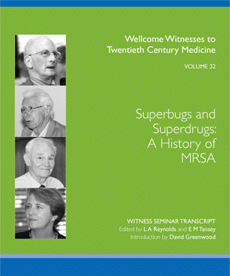Superbugs and Superdrugs: A History of MRSA
 Because of its unique adaptability and resistance to many antibacterial drugs and antiseptics, methicillin-resistant Staphylococcus aureus (MRSA) is a nosocomial menace of the present day. It has invaded medical and surgical wards in hospitals, infecting patients already ill or recovering, and endangering clean surgical operations, encouraged by overcrowding and limited air circulation. It has now spread from hospitals to families and communities. Infection control microbiologists and the Public Health Laboratory Service developed assays, ‘phage typing and other tests to identify strains, with better understanding of their behaviour aided by the discovery of the mecA gene. This Seminar addressed the biological reasons for this behaviour; the difference between resistant and non-resistant strains; the development, evolution and elucidation of drug resistance in hospital infection and its geographical distribution.
Because of its unique adaptability and resistance to many antibacterial drugs and antiseptics, methicillin-resistant Staphylococcus aureus (MRSA) is a nosocomial menace of the present day. It has invaded medical and surgical wards in hospitals, infecting patients already ill or recovering, and endangering clean surgical operations, encouraged by overcrowding and limited air circulation. It has now spread from hospitals to families and communities. Infection control microbiologists and the Public Health Laboratory Service developed assays, ‘phage typing and other tests to identify strains, with better understanding of their behaviour aided by the discovery of the mecA gene. This Seminar addressed the biological reasons for this behaviour; the difference between resistant and non-resistant strains; the development, evolution and elucidation of drug resistance in hospital infection and its geographical distribution.
Suggested by Professor Gordon Stewart and chaired by Dr Robert Bud, surgeons, microbiologists, infection control experts and representatives of the pharmaceutical industry and of the public included: Professor Graham Ayliffe, Professor Mark Casewell, Dr Bilwanath Chattopadhyay, Dr Stephanie Dancer, Dr Bernard Dixon, Dr Georgia Duckworth, Professor Brian Duerden, Professor Michael Emmerson, Professor Gary French, Professor Curtis Gemmell, Professor Alan Glynn, Dr Ian Gould, Professor David Greenwood, Professor Jeremy Hamilton-Miller, Dr Angela Kearns, Dr Bill Newsom, Professor Ian Phillips, Dr Tyrone Pitt, Dr Elizabeth Price, Professor Sir Mark Richmond, Dr Geoffrey Scott, Dr Joe Selkon, Dr David Shanson, Dr Norman Simmons, Professor Dale Smith, Professor Brian Spratt, Dr Robert Sutherland, Professor John West.
Introduction by Professor David Greenwood, 172pp, 2 appendices, 13 figures, biographical notes, references, glossary and index.
Reynolds L A, Tansey E M. (eds) (2008) Superbugs and superdrugs: A history of MRSA, Wellcome Witnesses to Twentieth Century Medicine, vol. 32. London: The Wellcome Trust Centre for the History of Medicine at UCL.
ISBN 978 085484 1141




